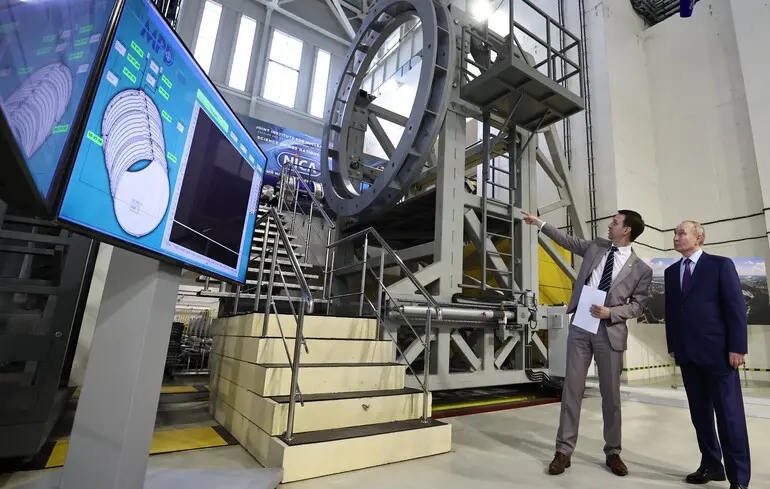False Neutrality Of Russian Science

International scientific cooperation is the basis of progress in science, where every contribution, regardless of country, is important for the overall development of humanity. Collaboration between scientists from different parts of the world enables the exchange of knowledge, resources and discoveries, which accelerates scientific breakthroughs. However, science does not exist in a vacuum and cannot stay away from global political and moral issues. Recently, as a response to the events unfolding in Ukraine, one of the largest international scientific organizations, CERN (European Organization for Nuclear Research), decided to cease cooperation with Russian and Belarusian scientists. This decision was an important and painful step that reflects not only the political reality but also the principled position of the global scientific community. Although researchers from the institutions of the aggressor country have already packed their bags, it is too early to rejoice. Russia still has opportunities for international cooperation, even in the field of defense research. So, the struggle for Russia’s scientific isolation continues. As a representative of Ukraine at CERN, I was directly involved in these events. How did things go at CERN and what problems remained unresolved?
How it happened
One of the first people to call me in early March was the President of the CERN Council, Professor Eliezer Rabinovich. He asked how things were going and informed me that an extraordinary meeting of the Council was scheduled for March 8, at which decisions would be made on the status of Russia and Belarus in CERN.
This meeting took place, and as a result, the CERN Council adopted a resolution in which it strongly supported the people of Ukraine, as well as the independence, sovereignty and territorial integrity of Ukraine, strongly condemned the military invasion of Ukraine by the Russian Federation in violation of Article 2 (4) of the UN Charter, condemned the involvement of the Republic of Belarus in the unlawful use of force against Ukraine, suspended the observer status of the Russian Federation until further notice and decided that CERN would not engage in new cooperation with the Russian Federation and its institutions.
The next meeting of the CERN Council took place two weeks later. This time it considered issues related to the implementation of the decisions made, and, at my suggestion, managed to add the Joint Institute for Nuclear Research (JINR) to Russia and Belarus, i.e. to extend the restrictions to this international organization based in Dubna, Russia, 110 km north of Moscow. However, the CERN Council decided to postpone the final decision on continuing cooperation with Russia, Belarus and JINR, first until June 2022, and then, in June 2022, until their contracts were renewed in November 2024, June 2024 and January 2025, respectively.
This decision led to complications in the operation of CERN experiments. One of the most important aspects of scientists’ activities is publication activity. Since CERN experiments are performed at the forefront of science, they have high citation indices and the scientists involved in the collaboration have a high h-index. This also applies to the institutes, laboratories and higher education institutions where these scientists work. In addition, since experiments are expensive, publications usually express gratitude to the organizations that provide funding.
A struggle unfolded around this. The Russians tried in every possible way to sneak the decision through so that nothing would change. I met with the heads of all the major CERN experiments, and they practically convinced me that this was the best solution. The end of March. Bucha and Irpin. I went to the office of Luc Malgueri, the head of one of the main CERN collaborations, and said that Ukraine would not vote for the proposed decision. At that time, the words of the Ukrainian side were heeded. We insisted that any mention of Russia, Belarus as well as JINR and instututes supporting the war be removed from publications altogether.
By the end of the summer of 2022, the leadership of CERN and its large experiments had formulated two options, both not in our favor. We were offered to choose the lesser of two evils: Ukrainian scientists would either have to sign scientific articles together with Russian institutions that openly supported the war or stop signing articles altogether. Our youth immediately got involved, and at the last moment, very publicly, the option from Ukraine was put up for discussion. Fortunately, we were heard. Looking ahead, it won the vote in all the collaborations in early 2023, although this was preceded by a lot of work. Many meetings, discussions and arrangements. There was the tireless work of Ihor Kostiuk in the LHCb collaboration, the fiery intervention of Anastasiia Velyka at the CMS collaboration meeting, the indignant message of Oleksii Lukianchuk when the members of the ATLAS collaboration were asked who wanted to present the findings at a conference in Russia... All this had strong support from the National Academy of Sciences of Ukraine, in particular its president, corresponding member Anatolii Zahorodnyi. We did not always find support among our own. Our victory was unexpected for the Russians. But it was and continues to be significant because attempts by those who “sympathize” to revise these decisions continue to this day, under the pretext of supporting young scientists and with claims that this is discrimination and that “science is out of politics.”
The next achievement was the decision of the CERN Council in December 2023 not to renew the participation agreement of both Belarus and Russia. On November 30, 2024, scientists from Russian institutes left Geneva with their suitcases. The Belarusians followed suit in the summer of 2024.
And all this time, since 2022, hard work has been going on to convince CERN Council members that cooperation with the Joint Institute for Nuclear Research (JINR) is dangerous and impractical.
What is JINR?
JINR is located in Dubna, Russia. In addition to JINR, this city is home to the Raduga design bureau and its construction plant, which produces parts for military aircraft (Su-25, Su-34) and cruise missiles, such as the X-55 and X-101. An X-101 missile destroyed the Okhmatdyt children’s hospital in Kyiv in July. In addition, most of the missiles used in Russia’s attack on Ukrainian energy facilities on November 17 were made in Dubna. Raduga and its production plant were openly included in the list of JINR collaborating institutes until 2016. Raduga has conducted joint research with JINR and continues to conduct joint training, housing construction in Dubna, etc.
In addition, in 2005, JINR initiated the creation of a Special Economic Zone in Dubna, which houses many other military enterprises specializing in the production of drones, electronic components, technical fabrics and military equipment.
JINR scientists and the companies they work with in Dubna also share their knowledge with countries that support Russian aggression in Ukraine: Iran and North Korea. Dubna’s Special Economic Zone signed a cooperation agreement with Iran in 2023 and hosted a North Korean ministerial visit in April 2024 to expand cooperation.
In 1995, JINR founded the Dubna State University, where JINR scientists and engineers train personnel not only for military enterprises in Dubna but also, since 2023, run a special program to train electronic engineers for Iran.
JINR scientists are also working directly on dual-use projects, such as the development of fuel cells for drones or neutron activation methods for detecting defects in missile parts without dismantling them. It goes without saying that these projects contradict the JINR’s charter, which states that “the results of research obtained at the Institute can only be used for peaceful purposes for the benefit of humankind.” However, they are well aligned with the Russian government’s strategy for scientific and technological development, which was discussed at a meeting of the Russian Federation’s Council for Science and Education chaired by Vladimir Putin, held at JINR on June 13, 2024. JINR cooperates with more than 200 institutions in Russia, 79 of which are under sanctions in Ukraine and other countries for supporting the war against Ukraine.
Moreover, JINR has several joint ventures with Russia’s Federal Security Service (FSB). JINR security officers are FSB employees. Even the office of the JINR union is located in the FSB building in Dubna. But the biggest concern is that JINR scientists working at the FSB facilities are also members of large international collaborations. This provides them with unimpeded access to scientific institutions around the world.
After all, despite its involvement in scientific espionage, JINR claims to cooperate with 990 scientific institutions in more than 70 countries. This access is important because technological development is not Russia’s strong suit. Having used scientific espionage before to obtain new technologies (as in the case of the Manhattan Project), Russia now does so through participation in international research projects. Russian research institutes traditionally have a strong manufacturing infrastructure that allows not only to conduct experimental research with these new technologies but also to manufacture equipment, in particular for the Russian military-industrial complex.
In addition to access to CERN, JINR participates in experiments at two major US laboratories: neutrino experiments at FermiLAB near Chicago and experiments at the RHIC collider at Brookhaven National Laboratory near New York. JINR is also a participant in the DarkSide dark matter experiment at the underground Gran Sasso National Laboratory in Italy, the RICOCHET experiment in Grenoble, France, and the FAIR accelerator project in Darmstadt, Germany. It is also part of the Worldwide LHC Computing Grid project, which allows JINR and its partner institutes (many of which are working on military developments as described above) to perform computations using scientific computing infrastructure located in scientific centers around the world.
All of this attests to the power of Russian scientific propaganda: despite their cooperation with the FSB and participation in Russian military projects, scientists from JINR and, through it, other institutes in Russia continue to participate in international scientific projects, publish their articles in international journals and travel around Europe and the world with virtually no restrictions. This provides unlimited opportunities for acquiring new technologies useful for creating new weapons for use in Ukraine and beyond. JINR is not yet under sanctions in Ukraine. This should be corrected as soon as possible. Ukrainian scientists at CERN are redoubling their efforts to convince the scientific community at CERN and beyond of the dangers of continuing cooperation with JINR.
Read this article in Ukrainian and russian.
Please select it with the mouse and press Ctrl+Enter or Submit a bug











 Login with Google
Login with Google